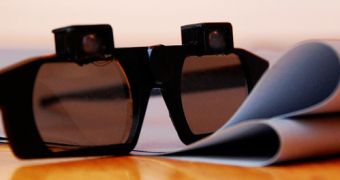The developers from Technical Illusions, Jeri Ellsworth former Valve Software guru and programmer Rick Johnson, have started a new crowdfunding campaign on Kickstarter for their CastAR system.
Their goal is to obtain $400,000 / € 296,000 until November 14, and although a day has passed, they have already managed to get more than half of the intended amount.
In case you are interested in what exactly CastAR is, it is a reality system that reveals holographic-like 3D projections right in front of the person using it.
The system incorporates an extremely fast and very precise tracking solution that allows you to move around by holding your 3D world in place.
It seems that they have managed to link the two worlds, the virtual one with the physical world, through two rare peripherals: the RFID Tracking and the Magic Wand.
The first one allows the user to identify, track and even augment physical objects like cards or board game pieces, across a surface. The second one, the Magic Wand is something similar to a controller and it allows you to position things in spaces as well as to control them with a joystick, all with just one hand.
The project includes two very important components, a pair of glasses and a surface. Two micro-projectors can be found in the lenses of the glasses, having the role of projecting a stereoscopic 3D image onto the surface.
Also, a tiny camera can be found in-between the projector for the infrared markers, markers that will track your head position and orientation so that the holographic scene will be adjusted correctly.
The surface is made of a particular material, one that bounces light from the projectors back to the glasses. It is a material that is similar to the one used in the making of traffic signs.
The developers assure future users that they will not experience eye strain as they will be able to see both visual and real-world environment at the same time.
A prototype is available from early 2013; therefore, one can assume that things are actually coming along.

 14 DAY TRIAL //
14 DAY TRIAL //